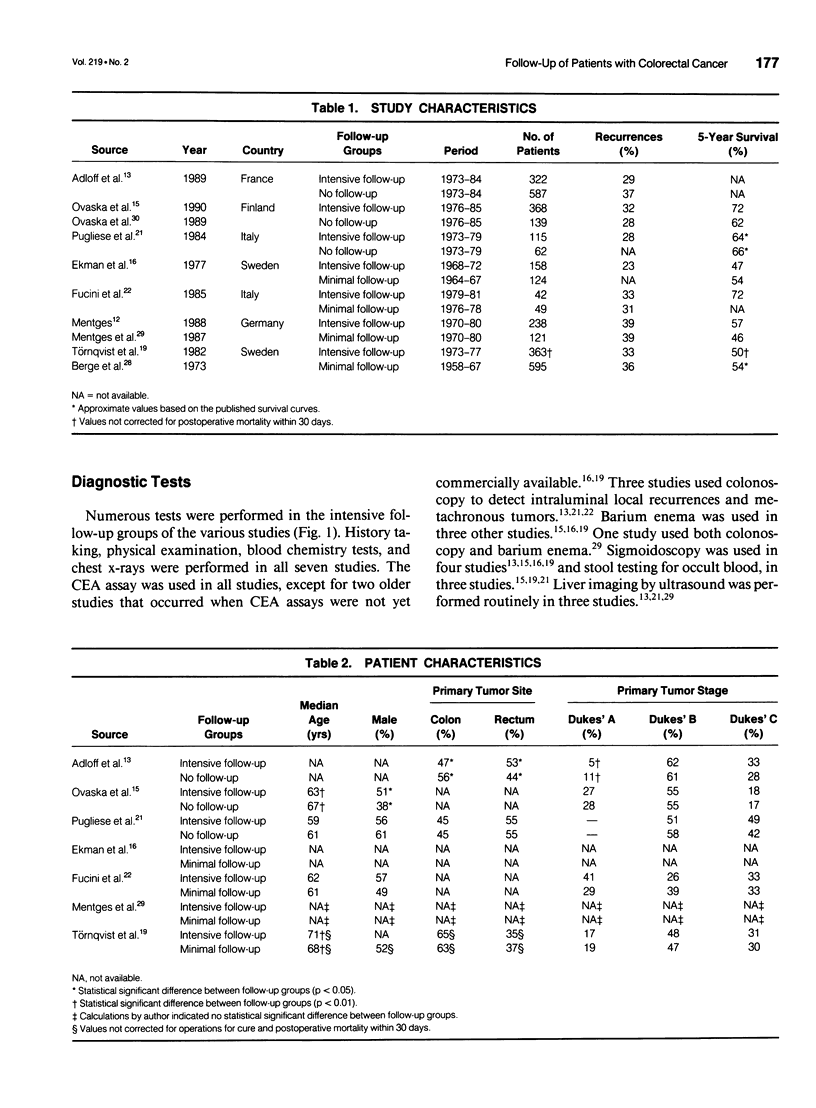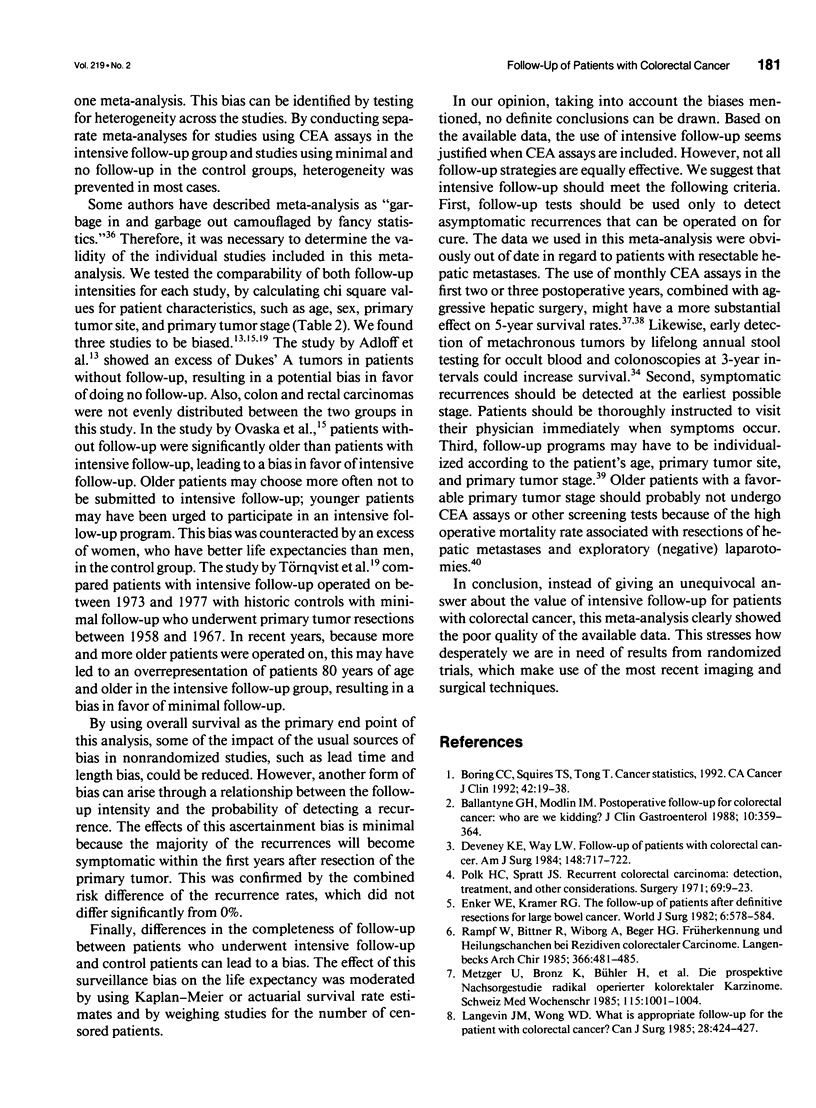Abstract
OBJECTIVE: The authors sought to determine whether intensive follow-up improves 5-year survival rates in patients with colorectal cancer who were operated on for cure. SUMMARY BACKGROUND DATA: Intensive follow-up of patients with colorectal cancer is still controversial. The present uncertainty in regard to the value of intensive follow-up could be the result of the absence of prospective randomized studies comparing patients with and without follow-up. METHODS: Studies comparing two follow-up programs of different intensities were identified in the medical literature and were aggregated in a meta-analysis using the "random effects method." Seven nonrandomized studies describing 3283 patients were analyzed. RESULTS: Patients with intensive follow-up did have 9% better 5-year survival rates than did those with minimal or no follow-up, only when intensive follow-up included carcinoembryonic antigen (CEA) assays. In addition, more asymptomatic recurrences were detected and more recurrences were resected in patients with intensive follow-up. CONCLUSIONS: This meta-analysis indicated that intensive follow-up using CEA assays can identify treatable recurrences at a relatively early stage. Treatment of these recurrences appears to be associated with improved 5-year survival rates. However, not all intensive follow-up strategies will be equally effective. Follow-up may yield the best results if diagnostic tests are used only to detect those recurrences that can be operated on with curative intent and when follow-up is "individualized," according to patient characteristics.
Full text
PDF








Selected References
These references are in PubMed. This may not be the complete list of references from this article.
- Adloff M., Arnaud J. P., Ollier J. C., Schloegel M. Peut-on améliorer le pronostic des malades opérés d'un cancer du côlon ou du rectum par une surveillance régulière? Etude prospective portant sur 909 patients. Chirurgie. 1989;115(3):228–237. [PubMed] [Google Scholar]
- Ballantyne G. H., Modlin I. M. Postoperative follow-up for colorectal cancer: who are we kidding? J Clin Gastroenterol. 1988 Aug;10(4):359–364. [PubMed] [Google Scholar]
- Beart R. W., Jr, O'Connell M. J. Postoperative follow-up of patients with carcinoma of the colon. Mayo Clin Proc. 1983 Jun;58(6):361–363. [PubMed] [Google Scholar]
- Berge T., Ekelund G., Mellner C., Pihl B., Wenckert A. Carcinoma of the colon and rectum in a defined population. An epidemiological, clinical and postmortem investigation of colorectal carcinoma and coexisting benign polyps in Malmö, Sweden. Acta Chir Scand Suppl. 1973;438:1–86. [PubMed] [Google Scholar]
- Boring C. C., Squires T. S., Tong T. Cancer statistics, 1992. CA Cancer J Clin. 1992 Jan-Feb;42(1):19–38. doi: 10.3322/canjclin.42.1.19. [DOI] [PubMed] [Google Scholar]
- Brunner H. Nachsorge beim kolorektalen Karzinom. Wien Med Wochenschr. 1988 Jun 30;138(11-12):261–263. [PubMed] [Google Scholar]
- Bülow S., Svendsen L. B., Mellemgaard A. Metachronous colorectal carcinoma. Br J Surg. 1990 May;77(5):502–505. doi: 10.1002/bjs.1800770509. [DOI] [PubMed] [Google Scholar]
- Cochrane J. P., Williams J. T., Faber R. G., Slack W. W. Value of outpatient follow-up after curative surgery for carcinoma of the large bowel. Br Med J. 1980 Mar 1;280(6214):593–595. doi: 10.1136/bmj.280.6214.593. [DOI] [PMC free article] [PubMed] [Google Scholar]
- DerSimonian R., Laird N. Meta-analysis in clinical trials. Control Clin Trials. 1986 Sep;7(3):177–188. doi: 10.1016/0197-2456(86)90046-2. [DOI] [PubMed] [Google Scholar]
- Deveney K. E., Way L. W. Follow-up of patients with colorectal cancer. Am J Surg. 1984 Dec;148(6):717–722. doi: 10.1016/0002-9610(84)90423-9. [DOI] [PubMed] [Google Scholar]
- Devesa J. M., Morales V., Enriquez J. M., Nuño J., Camuñas J., Hernandez M. J., Avila C. Colorectal cancer. The bases for a comprehensive follow-up. Dis Colon Rectum. 1988 Aug;31(8):636–652. doi: 10.1007/BF02556803. [DOI] [PubMed] [Google Scholar]
- Ekman C. A., Gustavson J., Henning A. Value of a follow-up study of recurrent carcinoma of the colon and rectum. Surg Gynecol Obstet. 1977 Dec;145(6):895–897. [PubMed] [Google Scholar]
- Enker W. E., Kramer R. G. The follow-up of patients after definitive resections for large bowel cancer. World J Surg. 1982 Sep;6(5):578–584. doi: 10.1007/BF01657872. [DOI] [PubMed] [Google Scholar]
- Fucini C., Rosi S., Herd-Smith A., Malatantis G., Panichi S. Significato e limiti del follow up intensivo dopo intervento radicale per cancro del colon-retto. Minerva Chir. 1985 Jun 15;40(11):783–786. [PubMed] [Google Scholar]
- Guttormsen A. B., Holm J. C., Horn A., Søreide O. Follow-up of patients with large bowel cancer: a critical evaluation. Acta Chir Scand. 1984;150(4):325–330. [PubMed] [Google Scholar]
- Isbister W. H. The follow-up of patients following surgery for colorectal cancer--a personal view. Ann Acad Med Singapore. 1988 Jan;17(1):66–71. [PubMed] [Google Scholar]
- Kievit J., van de Velde C. J. Utility and cost of carcinoembryonic antigen monitoring in colon cancer follow-up evaluation. A Markov analysis. Cancer. 1990 Jun 1;65(11):2580–2587. doi: 10.1002/1097-0142(19900601)65:11<2580::aid-cncr2820651131>3.0.co;2-i. [DOI] [PubMed] [Google Scholar]
- Kronborg O., Fenger C., Deichgräber E., Hansen L. Follow-up after radical surgery for colorectal cancer. Design of a randomized study. Scand J Gastroenterol Suppl. 1988;149:159–162. doi: 10.3109/00365528809096975. [DOI] [PubMed] [Google Scholar]
- Langevin J. M., Wong W. D. What is appropriate follow-up for the patient with colorectal cancer? Can J Surg. 1985 Sep;28(5):424–428. [PubMed] [Google Scholar]
- MANTEL N., HAENSZEL W. Statistical aspects of the analysis of data from retrospective studies of disease. J Natl Cancer Inst. 1959 Apr;22(4):719–748. [PubMed] [Google Scholar]
- Mann C. Meta-analysis in the breech. Science. 1990 Aug 3;249(4968):476–480. doi: 10.1126/science.2382129. [DOI] [PubMed] [Google Scholar]
- Mentges B. Kontroversen in der Nachsorge des Kolonkarzinoms. Zentralbl Chir. 1988;113(17):1087–1092. [PubMed] [Google Scholar]
- Mentges B., Stahlschmidt M., Brückner R. Die Effektivität der Nachsorge beim Coloncarcinom. Langenbecks Arch Chir. 1987;370(4):223–234. doi: 10.1007/BF01259310. [DOI] [PubMed] [Google Scholar]
- Metzger U., Bronz K., Bühler H., Dolder A., Seefeld U., Hollinger A., Largiadèr F. Die prospektive Nachsorgestudie radikal operierter kolorektaler Karzinome. Stand nach 5 Jahren. Schweiz Med Wochenschr. 1985 Jul 20;115(29):1001–1004. [PubMed] [Google Scholar]
- Ovaska J. T., Järvinen H. J., Mecklin J. P. The value of a follow-up programme after radical surgery for colorectal carcinoma. Scand J Gastroenterol. 1989 May;24(4):416–422. doi: 10.3109/00365528909093068. [DOI] [PubMed] [Google Scholar]
- Ovaska J., Järvinen H., Kujari H., Perttilä I., Mecklin J. P. Follow-up of patients operated on for colorectal carcinoma. Am J Surg. 1990 Jun;159(6):593–596. doi: 10.1016/s0002-9610(06)80074-7. [DOI] [PubMed] [Google Scholar]
- Polk H. C., Jr, Spratt J. S., Jr Recurrent colorectal carcinoma: detection, treatment, and other considerations. Surgery. 1971 Jan;69(1):9–23. [PubMed] [Google Scholar]
- Pugliese V., Aste H., Saccomanno S., Bruzzi P., Bonelli L., Santi L. Outcome of follow-up programs in patients previously resected for colorectal cancer. Tumori. 1984 Apr 30;70(2):203–208. doi: 10.1177/030089168407000216. [DOI] [PubMed] [Google Scholar]
- Püschmann H., Anders A., Winter J., Dorn B. Rationale computergestützte Nachsorge bei kolorektalen Tumoren. Kritische Anmerkingen zu einer Nachsorgesprechstunde. Med Welt. 1981 Apr 10;32(15):567–571. [PubMed] [Google Scholar]
- Rampf W., Bittner R., Wiborg A., Beger H. G. Früherkennung und Heilungschanchen bei Rezidiven colorectaler Carcinome. Langenbecks Arch Chir. 1985;366:480–485. doi: 10.1007/BF01836691. [DOI] [PubMed] [Google Scholar]
- Rocklin M. S., Slomski C. A., Watne A. L. Postoperative surveillance of patients with carcinoma of the colon and rectum. Am Surg. 1990 Jan;56(1):22–27. [PubMed] [Google Scholar]
- Secco G. B., Fardelli R., Campora E., Rovida S., Ratto G. B., Motta G. Postoperative surveillance of colorectal cancer according to risk category. Ital J Surg Sci. 1989;19(3):239–245. [PubMed] [Google Scholar]
- Steele G., Jr Follow-up plans after treatment of primary colon and rectum cancer. World J Surg. 1991 Sep-Oct;15(5):583–588. doi: 10.1007/BF01789202. [DOI] [PubMed] [Google Scholar]
- Sugarbaker P. H., Gianola F. J., Dwyer A., Neuman N. R. A simplified plan for follow-up of patients with colon and rectal cancer supported by prospective studies of laboratory and radiologic test results. Surgery. 1987 Jul;102(1):79–87. [PubMed] [Google Scholar]
- Törnqvist A., Ekelund G., Leandoer L. The value of intensive follow-up after curative resection for colorectal carcinoma. Br J Surg. 1982 Dec;69(12):725–728. doi: 10.1002/bjs.1800691213. [DOI] [PubMed] [Google Scholar]
- Wachter K. W. Disturbed by meta-analysis? Science. 1988 Sep 16;241(4872):1407–1408. doi: 10.1126/science.3420397. [DOI] [PubMed] [Google Scholar]
- Wenzl E., Wunderlich M., Herbst F., Schemper M., Feil W., Rauhs R., Schiessel R. Results of a rigorous follow-up system in colorectal cancer. Int J Colorectal Dis. 1988 Aug;3(3):176–180. doi: 10.1007/BF01648363. [DOI] [PubMed] [Google Scholar]


